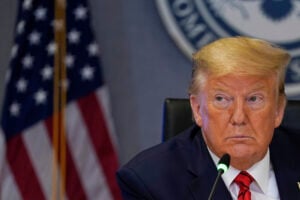
(Photo by Evan Vucci-Pool/Getty Images)
Trump has been an addiction of mine since becoming president. Never before have I been so entertained by politics. As one of my indigent clients put it when she voted for him four years ago, “He tells it like it is.”
There’s a certain gumption in that — a nice break from politics as usual where what most politicians say is vetted 10 different ways for how it’ll play before it gets said.
Trump never had that problem. He was always bigger than life, unafraid of whomever he alienated, and ready to exaggerate (and even lie) when it suited him.
How was it that normally rational people (my family included) fell so easily under his spell? People who wouldn’t buy a used car without checking the Blue Book price and at least two other dealers, were willing to accept Trump’s (mis)representations.
He cultivated a fan base so enamored of him because he wasn’t the bogeyman on the left that he walked on water. Even now, when he acts like a badly behaved eighth grader who challenges the teacher for giving him an “F,” his fan base lines up behind him shouting “four more years.” Worse, his venomous antigovernment talk (ironic, coming from the leader-in-chief himself) is casting doubt on bedrock democratic principles like the legitimacy of voting and the watch-dog role of the media.
If behavior like Trump’s came from any other elected official (challenging the very system he oversees), that person would be deemed unfit for office. What if a judge presiding over a trial decided that the system was rigged and the jury verdict was wrong? What if he persuaded the foreperson to say there was fraud in the jury room so he could overturn the verdict? That judge would be fired, right?
Somehow Trump escapes this commonsense analysis.
That’s why I think the issue of whether he’d be permitted to pardon himself, a subject that’s been bandied about lately as though it’s bound to happen, is not likely to arise.
While it’s common for presidents to dole out pardons for friends, relatives, and colleagues in the waning months of their administration, and while many think Trump is certainly not beyond being the first president with the audacity to seek a pardon for himself, first he has to believe he’ll be indicted for a crime, and next he has to accept some responsibility for whatever crime might be coming down the pike.
My sense is Trump is unlikely to be prosecuted. Although many in the country don’t like him and suspect he’s committed crimes including engaging in quid pro quos with foreign leaders to promote his own businesses, putting a name on such offenses will be tough. Violating the emoluments clause doesn’t bring criminal prosecution, only civil. And, according to a paper from JustSecurity.org, there’s not much guidance on how such a suit would work. Finding parties with standing (those directly harmed by any violation) would be the first hurdle.
Next, President-elect Joe Biden is against pursuing any prosecution. Such attempts would further divide the country between the Trump and non-Trump camps, disrupting unification — a major theme for Biden.
Finally, for Trump to pardon himself, he’d have to admit he did something wrong, something just not in his DNA. Trump, above all, is a creature of his own ego.
Any preemptive pardon he’d potentially give himself would only apply to federal prosecutions, still leaving him open to state criminal actions plus all future wrongdoings, both state and federal.
So, while it’s fun to muse about any president pardoning himself, unless Trump can couch it in terms of “I did nothing wrong, but they’re out to get me anyway,” it’s unlikely to happen. Although, I must admit, I’d like to see him try.
Toni Messina has tried over 100 cases and has been practicing criminal law and immigration since 1990. You can follow her on Twitter: @tonitamess.

